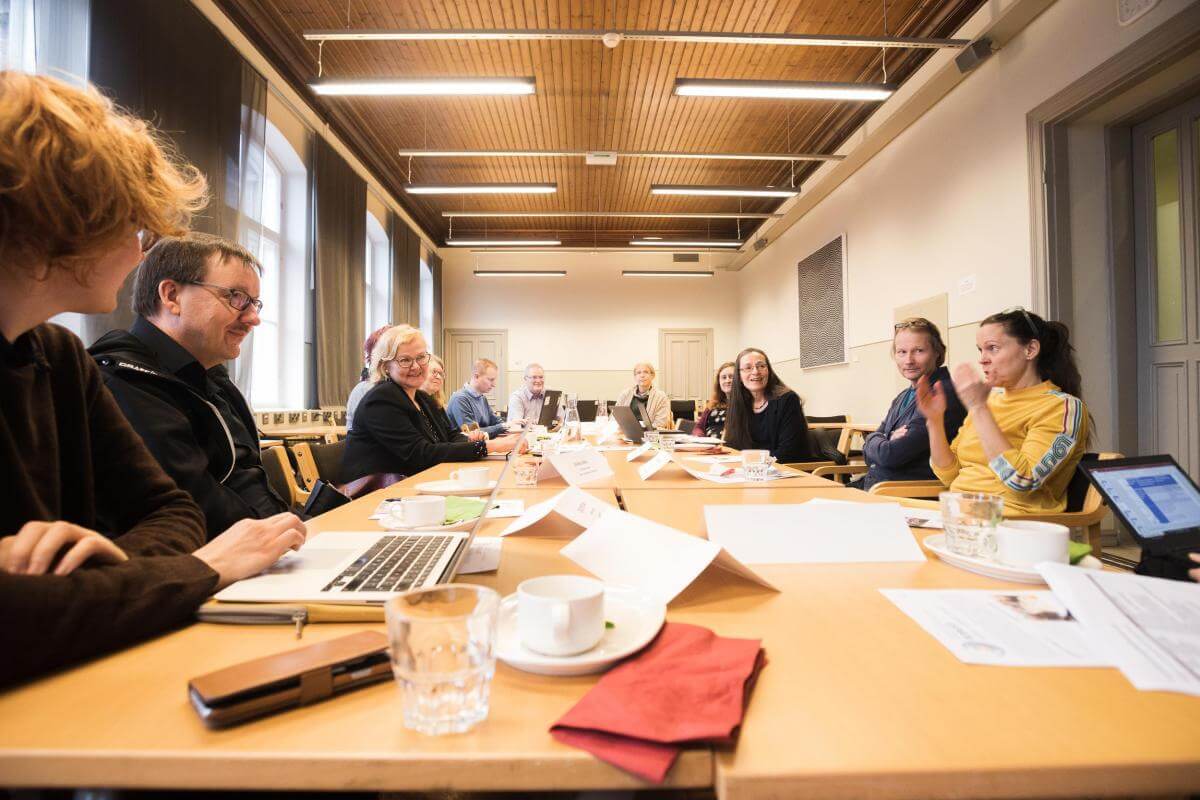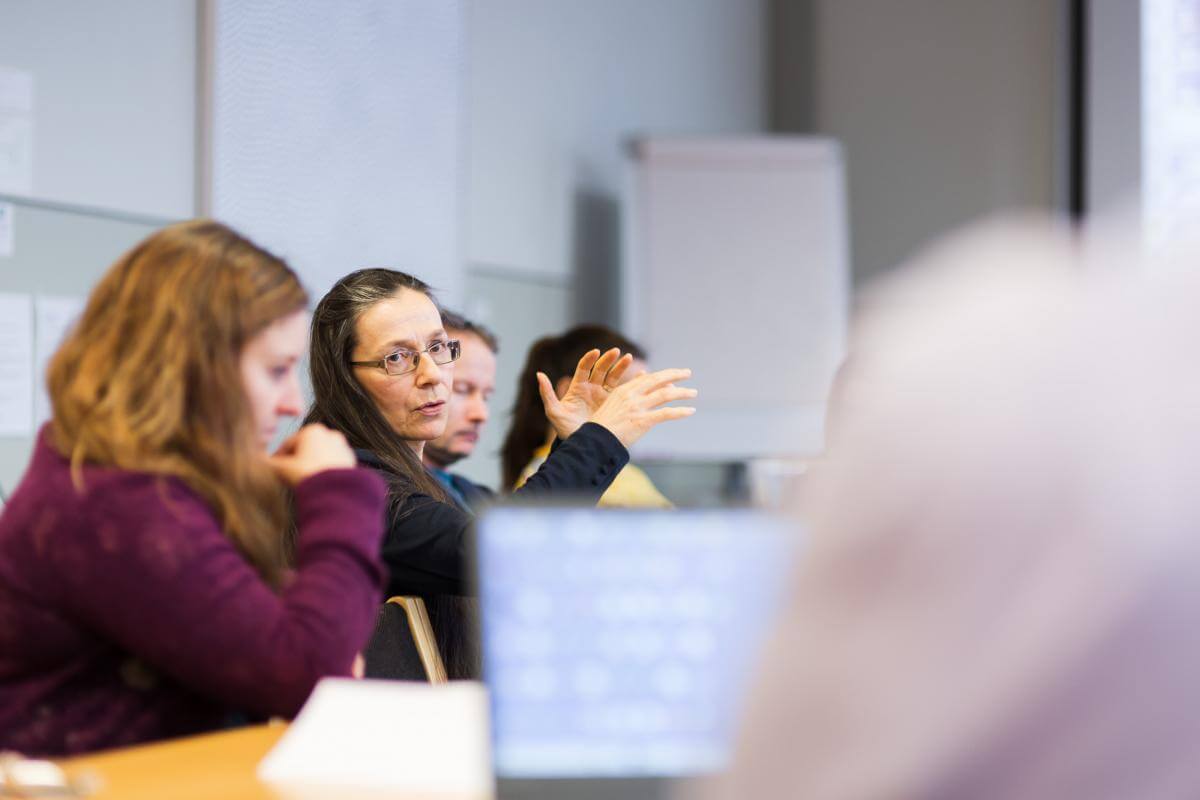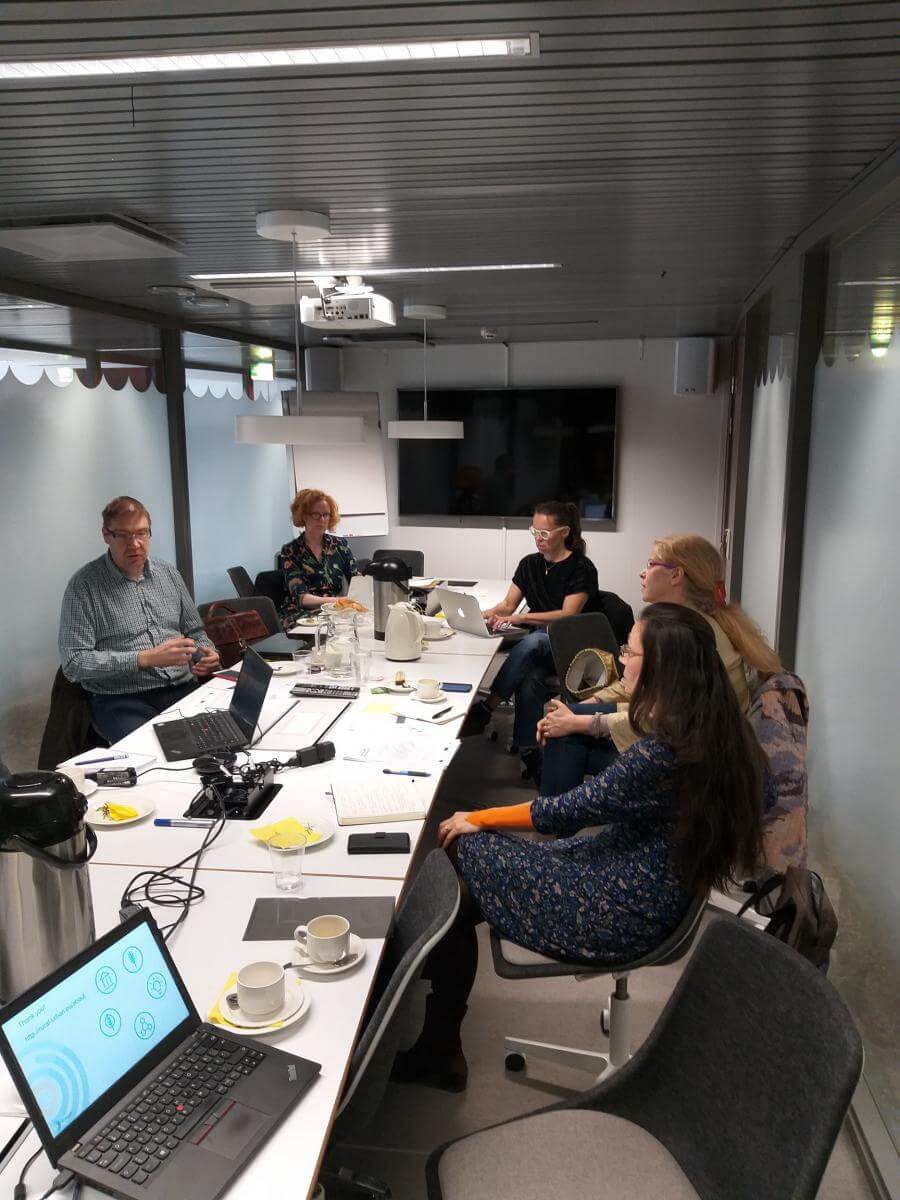Helsinki
Live Cases
Live Cases are a real-time journaling process for the Living Lab case studies. Follow along quarterly to learn more about the experiences and lessons learned taking place in the ROBUST Living Labs.
Live Case 5: Process Innovations
We have defined two innovation objectives in the Helsinki Living Lab’s Research and Innovation Agenda. Since both of them are processes, rather than concrete goals, we are in the middle of the reflection phase and our views are still evolving.
The first innovation of Helsinki Living Lab is an experimental form of co-governance: a kind of meta-network space or platform that could support more integrated rural-urban governance policy. The ultimate aim of the meta-network space is to bring the relevant actors of rural-urban interaction together.
Urban and regional policies are fairly developed in Finland but the linkages between these policy fields are weak, and rural-urban interaction is of low priority, especially in urban policy. To achieve the innovation goal, we have continued to stimulate the discussion and connections between key urban and rural stakeholders.
In addition, we have shared data, knowledge and maps about multilocality and the multiple residency issue to relevant representatives. We are also working on a scientific article based on the data collected in ROBUST project.
The second innovation objective of our LL is to plan a model of governance arrangements to enhance research-based decision-making. The goal is embedded in the first objective, and is an essential part of all our project activities. To accomplish the second innovation – in the addition to the actions mentioned above – we have collected information on different governance arrangements from our LL and partners. This work will continue well into 2021 and directly support the project’s cross-lab analysis of governance arrangements.
Live Case 4: Timely Research in Corona Times
The Helsinki Living Lab has continued exploring ways to create new joint practices between rural and urban actors within the Helsinki-Uusimaa region in the first half of 2020. COVID-19 has of course been the major “event” and determiner for the work on all Living Labs, but we still have been able to make progress in our ROBUST duties.
Since Luke is responsible for WP5 (governance arrangements) and the regional workshops are meant to be the major source of case information from all the partners, we started to plan the framework and templates for the workshops in Fall 2019. The Helsinki LL regional workshop took place on 24 January 2020, and so it was a “pre-corona” event.
The starting point of our workshop was the motto: “Developing resilient rural-urban solutions that enable knowledge networks and multiple locations for life, work and entrepreneurship”.
We used a backcasting method in the workshop, which means that a common vision on urban-rural synergies in Helsinki LL for 2030 was sketched first, and then the necessary actions and measures for achieving that vision were discussed. A total of ten stakeholder actors from different organizations took part in the workshop, in addition to the whole Helsinki LL team. The debate was very lively and many good ideas were presented by the participants.

So far so good, and we continued to make preparations for the Informed Cities Forum and workshops in Lucca in April, which was meant to be the major data collection event for WP5. Then COVID-19 forced the cancellation of most regional workshops in the different ROBUST Living Labs and the Informed Cities Forum, and so we were not able to proceed as planned.
The first confirmed COVID-19 case in Finland was found in Lapland from a Chinese tourist who had arrived in Finland on 23 January – one day prior to our regional workshop in Helsinki. The government of Finland first hesitated how to act (as in many countries), but then heavy policy tools were taken into action. For example, most schools were closed and most enterprises and public organizations (excluding emergency and health care) moved to telecommuting. The strongest tool was to bring in to use the Emergency Powers Act which has very rarely been used during peace times.
The most dramatic corona measure affecting our Living Lab was closing the borders of the Uusimaa province for three weeks in March-April. The epidemic hit the Helsinki region hardest and so only necessary and licensed traffic to other parts of the country was permitted in order to slow the spread of the disease. According to international comparisons, Finland has – so far – been quite successful in controlling the epidemic.
The regional workshop cancellations in other LL’s and Lucca meeting have been our major project-wide obstacles in 2020, but the epidemic has not affected our local cooperation in the Helsinki LL. We have had a couple of online meetings with the Luke and city of Helsinki LL staff, using both Skype and Teams. The situation has been even a benefit in that sense that we have saved time for writing (and thinking) since travelling and commuting have been prohibited.

COVID-19 has brought an interesting change to the movement of people, which is at the core of our Living Lab study. Increased interest to teleworking and staying in isolated summer cottages as a “corona refugee” has lifted our key theme – multilocality – into an unprecedented level in public discussion and policy debates. The epidemic has forced even the old-fashioned employers and other organizations to take a telecommunications leap to enable place-independent work.
This means that multilocality is suddenly a much more timely research theme than we anticipated some months ago!
Live Case 3: Examining the Future of Urban-Rural Relations
In the Helsinki Living Lab, our aim is to explore the possibilities to create new joint practices between rural and urban actors within the Helsinki-Uusimaa region. In a way we are studying if there a need for a so-called “meta-network platform” to pave the way for a new, more integrated rural-urban governance policy.
The main research themes have been 1) the significance of multiple residence, 2) the knowledge networks and locational choices for enterprises and work in the region and 3) the sustainable utilization of ecosystem services with land use and building planning in the Helsinki-Uusimaa region.
In October 2019, we organized a half-day regional workshop to our stakeholders in Helsinki-Uusimaa region. The workshop invitations were sent to more than 25 persons from different organisations. Fifteen stakeholders responded and participated in the workshop: nine from the invited stakeholder groups and six from our ROBUST team.
Five of the invited participants represented the public sector, three represented civil society or non-government organizations and one participant represented citizen interest groups. Unfortunately, we did not get any participants from the state organizations, private sector or universities, other than those from our own ROBUST team.
.jpg)
The aim of the workshop was to discuss the current changes and trends that affect the future of the urban-rural relations and cross-sectoral interactions in the Helsinki-Uusimaa region (LL). We focused the discussion particularly on the issues of housing and the labour markets from the viewpoint of multi-local housing and work.
- How is this phenomenon visible at present in the everyday living of the people in Helsinki-Uusimaa region
- How do the new forms of housing and work affect the supply and demand for services
- What kinds of cross-sectoral actors there are in this field and how well do they function?
Our participants mentioned many forms of rural-urban interactions and were able to name several key actors in this field. However, they also recognized several bottlenecks and structural limitations to well-functioning rural-urban linkages, particularly in the fields of multi-local housing and work. Competition between municipalities, lack of well-connected public transport facilities, as well as lack of services for multi-local residents were mentioned as some examples of issues that need resolving.
.jpg)
One of the main lessons learned from our workshop is that, although there are several active actors in the sphere of rural-urban linkages, there are also many competing views and interests that are not always easy to combine. Most participants agreed that multi-local housing is not very well recognised as a phenomenon in current planning practices, and this may need further attention.
Another lesson learned is that it turned out to be very challenging to get stakeholders to participate at the workshop. Although many initially showed interest, they were not able to attend our workshop due to other more pressing engagements. Our decision to start the workshop with a short tailor-made video (in Finnish) turned out to be success! The video sparked discussion and introduced our topics in an inspiring way.
The third lesson learned might be that it is important to create an inspiring atmosphere for the discussion at the very beginning of stakeholder workshops.
Live Case 2: Co-Creating a New Vision for Rural-Urban Governance
Our starting point is that, in Finland, rural, urban and regional policies are fairly developed, and the actors are already well organized with sophisticated policy tools, particularly in rural policy. However, the linkages between these policy fields are weak, and rural-urban interaction is a low priority, especially in urban policy.
Thus, the envisioning phase is important for us to get in touch with relevant actors and networks to co-create visions of rural-urban interaction and governance policy.
The aim of our LL is to establish a meta-network space or platform where we can experiment with new co-governance arrangements. In the envisioning phase, we first analyzed selected reports and existing studies. We gathered new data to conduct empirical research on the knowledge networks and locational choices of entrepreneurs and work in our case study area: Helsinki–Uusimaa region and Helsinki–Tallinn cross-border region.
We also mapped relevant actors and networks of rural-urban interaction in the Helsinki-Uusimaa region. We presented the ROBUST project and the Helsinki LL to these stakeholders, including Helsinki-Uusimaa Regional Council (joint regional authority) and Helsinki Region Environmental Services Authority (HSY).
In April 2019, we hosted a workshop for NGOs to discuss their current activities and future needs regarding rural-urban interaction and governance. Many of the networks are already operating in the rural-urban interface. In the workshop, we had participants from three Local Action Groups in the Uusimaa Region (LEADER Emo, LEADER Ykkösakseli, LEADER Pomoväst) representing rural networks. We also had representatives of urban associations located in Helsinki: The Rehabilitation Foundation, NPO Yhteismaa and Helsinki Neighborhood Association (Helka ry).
The main idea for organizing a separate NGO workshop was to openly discuss the opportunities and challenges that NGOs, and locally-driven initiatives at the implementation level at large, are currently facing.

NGO workshop in Helsinki 25th April 2019
The perspective of the NGOs on rural-urban interactions is positive: the enthusiastic people engaged in NGO activities are well-networked within and across regions, and share an interest in alternative lifestyles or new trends, such as multi-local living and revitalization of villages and city neighborhoods alike. Moreover, the Local Action Groups of Uusimaa region have funded a few on-going projects that could be integrated in the activities of LL Helsinki.
The main challenge in activities lies in the existing governance arrangements; public administration, especially in cities, works via their own channels and structures. Hence, the role of NGOs is restricted to small-scale activities with little or no funding.
We conclude that establishing the planned meta-network space or platform could further strengthen the role of local initiatives and bottom-up approaches in rural-urban interaction governance. The meta-network could serve as a platform for mutual discussions and cooperation and provide the administration and politicians with information and needs from the implementation level.
Our LL themes (new business models and labour markets; public infrastructure and social services; and ecosystem services) include many practical issues connected to functional relations between urban and rural areas, like the need for social and health care services for multiple residence people and families, and the contradictions and consolidation in land use planning between rural and urban areas.
Our assumption is that if these themes would be included more clearly in the networks’ agendas, this would increase and improve joint understanding of functional rural-urban relations.
In the next phase, we will arrange a workshop with all stakeholders to further develop our activities. With the help of the LL we will study and facilitate the creation of new joint practices within the Helsinki and Uusimaa region. The new practices and governance spaces will focus on the three themes of our LL as described above.
In May 2019, we will also organize a seminar on Helsinki – Tallinn Twin City Development together with other local actors and the city of Tallinn. The results of our ROBUST Helsinki–Tallinn study will be presented at the seminar and further discussed together with the stakeholders.
Live Case 1: Fostering a Rural-Urban "Meta Network" in Helsinki
In Finland rural, urban and regional policies are fairly well developed, and the actors are already well organized with access to sophisticated policy tools, particularly in rural policy. However, the linkages between these policy fields are scarce, and rural-urban interaction has hardly any priority, especially in urban policy. With the help of the Helsinki Living Lab, we will study and facilitate locally the creation of new joint practices within the Helsinki region and Uusimaa region. The new practices and governance spaces will focus on the three objectives we have chosen:
- Objective 1 is to obtain a new understanding of the knowledge networks and locational choices for enterprises and work in the case study area.
- Objective 2 aims to make visible, measure and show the significance of multiple residence in the spatial interaction between urban and rural areas.
- Objective 3 is to explore how the sustainable utilization of ecosystem services should be taken into account with land use and building planning in the Helsinki-Uusimaa region.
The innovative aspect of the Helsinki Living Lab will thus be an experimental form of governance. In this case, a kind of a “meta-network platform” to pave the way for a new, more integrated rural-urban governance policy. This would mean that multi-local living, for instance, could be a part of planning, strategic management and decision-making processes in the future. In the case of multiple residences, we shall also aim to co-create new policy measures. We also want to discover new model(s) to enhance research based decision-making. This objective is embedded in the other innovation activities, as an immoveable part of those activities.
Many of the rural networks we will be working with are already operating not only in rural areas, but also in the rural-urban interface. Our Living Lab themes include many practical issues connected to functional relations between urban and rural areas, like the need for social and healthcare services for multiple residence people and families, and the contradictions and consolidation in land use planning between rural and urban areas. Our assumption is that if these themes would be included more explicitly in the agendas of these networks, the joint understanding of functional rural-urban relations would increase and improve.
Our innovations are genuinely about governance arrangements. The idea is to co-create a new experimental rural-urban governance platform, which will provide the already existing actors and networks with improved capacity and tools to improve the things they are already doing. The rural networks in question already involve stakeholders from the public, private and third sector. They are also participatory and regionally representative. We aim to exploit these existing governance models and relations and try to find out if and how the participatory approach could be strengthened at the “meta-network” level.